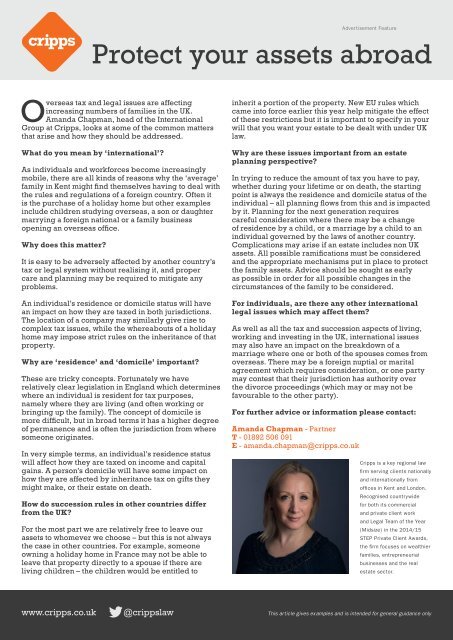Wealden Times | WT165 | November 2015 | Gift supplement inside
Wealden Times - The lifestyle magazine for the Weald
Wealden Times - The lifestyle magazine for the Weald
Create successful ePaper yourself
Turn your PDF publications into a flip-book with our unique Google optimized e-Paper software.
Advertisement Feature<br />
Protect your assets abroad<br />
Overseas tax and legal issues are affecting<br />
increasing numbers of families in the UK.<br />
Amanda Chapman, head of the International<br />
Group at Cripps, looks at some of the common matters<br />
that arise and how they should be addressed.<br />
What do you mean by ‘international’?<br />
As individuals and workforces become increasingly<br />
mobile, there are all kinds of reasons why the ‘average’<br />
family in Kent might find themselves having to deal with<br />
the rules and regulations of a foreign country. Often it<br />
is the purchase of a holiday home but other examples<br />
include children studying overseas, a son or daughter<br />
marrying a foreign national or a family business<br />
opening an overseas office.<br />
Why does this matter?<br />
It is easy to be adversely affected by another country’s<br />
tax or legal system without realising it, and proper<br />
care and planning may be required to mitigate any<br />
problems.<br />
An individual’s residence or domicile status will have<br />
an impact on how they are taxed in both jurisdictions.<br />
The location of a company may similarly give rise to<br />
complex tax issues, while the whereabouts of a holiday<br />
home may impose strict rules on the inheritance of that<br />
property.<br />
Why are ‘residence’ and ‘domicile’ important?<br />
These are tricky concepts. Fortunately we have<br />
relatively clear legislation in England which determines<br />
where an individual is resident for tax purposes,<br />
namely where they are living (and often working or<br />
bringing up the family). The concept of domicile is<br />
more difficult, but in broad terms it has a higher degree<br />
of permanence and is often the jurisdiction from where<br />
someone originates.<br />
In very simple terms, an individual’s residence status<br />
will affect how they are taxed on income and capital<br />
gains. A person’s domicile will have some impact on<br />
how they are affected by inheritance tax on gifts they<br />
might make, or their estate on death.<br />
How do succession rules in other countries differ<br />
from the UK?<br />
For the most part we are relatively free to leave our<br />
assets to whomever we choose – but this is not always<br />
the case in other countries. For example, someone<br />
owning a holiday home in France may not be able to<br />
leave that property directly to a spouse if there are<br />
living children – the children would be entitled to<br />
inherit a portion of the property. New EU rules which<br />
came into force earlier this year help mitigate the effect<br />
of these restrictions but it is important to specify in your<br />
will that you want your estate to be dealt with under UK<br />
law.<br />
Why are these issues important from an estate<br />
planning perspective?<br />
In trying to reduce the amount of tax you have to pay,<br />
whether during your lifetime or on death, the starting<br />
point is always the residence and domicile status of the<br />
individual – all planning flows from this and is impacted<br />
by it. Planning for the next generation requires<br />
careful consideration where there may be a change<br />
of residence by a child, or a marriage by a child to an<br />
individual governed by the laws of another country.<br />
Complications may arise if an estate includes non UK<br />
assets. All possible ramifications must be considered<br />
and the appropriate mechanisms put in place to protect<br />
the family assets. Advice should be sought as early<br />
as possible in order for all possible changes in the<br />
circumstances of the family to be considered.<br />
For individuals, are there any other international<br />
legal issues which may affect them?<br />
As well as all the tax and succession aspects of living,<br />
working and investing in the UK, international issues<br />
may also have an impact on the breakdown of a<br />
marriage where one or both of the spouses comes from<br />
overseas. There may be a foreign nuptial or marital<br />
agreement which requires consideration, or one party<br />
may contest that their jurisdiction has authority over<br />
the divorce proceedings (which may or may not be<br />
favourable to the other party).<br />
For further advice or information please contact:<br />
Amanda Chapman - Partner<br />
T - 01892 506 091<br />
E - amanda.chapman@cripps.co.uk<br />
Cripps is a key regional law<br />
firm serving clients nationally<br />
and internationally from<br />
offices in Kent and London.<br />
Recognised countrywide<br />
for both its commercial<br />
and private client work<br />
and Legal Team of the Year<br />
(Midsize) in the 2014/15<br />
STEP Private Client Awards,<br />
the firm focuses on wealthier<br />
families, entrepreneurial<br />
businesses and the real<br />
estate sector.<br />
www.cripps.co.uk @crippslaw This article gives examples and is intended for general guidance only


















